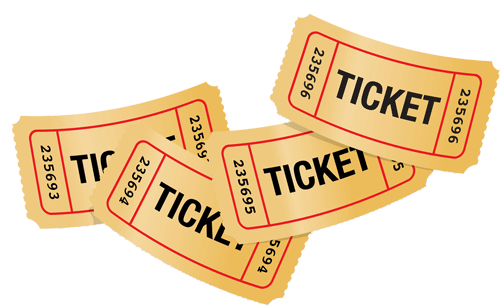 Here’s the Ticket!
Here’s the Ticket!
SB 268, an amendment to Florida Amusement Machine Law of 2013, passed both Florida legislative houses and is on its way to Gov. Scott for signature. As reported in the trade press, SB 268 had already passed the Regulated Industries, the Finance and Tax, and Appropriations (on April 16th) committees. “It was expected to pass its last hurdle, the Senate, before heading for a signature by Gov. Scott. If signed, as expected, it is scheduled to take effect July 1, 2015.” The amendment better defines and undoes several of the flaws and some of the unforeseen problems that the 2013 hastily passed gaming law inadvertently imposed on Florida’s amusement game industry.
Key elements of the proposed law include : [My comments are in red]
- Defining an amusement game: “Amusement game or machine is defined as a game or machine operated only for the bona fide entertainment of the general public which a person activates by inserting or using currency or a coin, card, coupon, slug, token, or similar device, and, by the application of skill, with no material element of chance inherent in the game or machine, the person playing or operating the game or machine controls the outcome of the game.” [This permits games to be operated by bills and/or debit card systems which is illegal under the current law.]
- Equipment can offer free or bonus play but number of additional plays is limited to 15 and player cannot redeem or exchange free or bonus plays for anything of value. The language states, “A free replay is not a separate game played.” [For example, this last sentence makes free plays on pinball games illegal because the free game is a separate new game starting at zero, but would permit free balls extended play or extended play on all amusement games as long as there was a limit of 15. I wonder what would happen if a player did not win on his 16th attempt on a ‘play to win’ crane? The new law states that the game cannot keep track of free or bonus plays so this section is still confusing as debit card systems do keep track of bonus plays on each game (as opposed to paid plays) but the actual amusement game does not know the difference. The proposed law also states that a debit card must be prefunded and the value diminished by the price/play each time a game is activated. Again debit cards can have a cash balance, a bonus play balance, and even be operated on time play so all of this could be in violation. Perhaps all of this is mute because intent may be that the legislators were only thinking about video games when they wrote this section.]
- Amusement games that issue tickets, points, or coupons (Type 1-redemption), must have winnings be redeemed only onsite [and not on-line or at any other physical location] for merchandise. Maximum award per play is limited to $5.25 wholesale. The maximum value of a redemption prize redeemed is limited to 100 times the price/play limit or $525.
- Amusement games that offer a prize internally (Type 2-a crane or merchandiser), that prize is limited to a wholesale value of 10 times the $5.25 or $52.50. Gift cards and anything that can be converted to cash or activate an amusement machine are prohibited. [This means that a debit card with a game play value or bags of tokens cannot be used as prizes in a merchandisers or as a redeemable prize but as I interpret it, a debit card with only redeemable points would be permitted. Technically the language states that gift cards are specifically prohibited lumped in with ‘anything that can be converted to cash, perhaps reasoning that most gift cards can be converted to cash. Very confusing as gift cards can be sold between members of the general public for cash as can any prize won.]
- The above limits can increase annually starting in 2017 based on a formula applied to the Consumer Price Index to account for inflation.
- Expansion of the locations that Type 1 games are permitted. Listed are arcade amusement centers, truck stops, bowling centers, time share facilities, public lodgings, and licensed public food services. Type 2 games are permitted in the same locations as Type 1 plus retail locations,and veterans’ service organizations or divisions with an alcoholic beverage license. [This obviously does not cover many locations that currently have Type1 or Type 2 games.]
- “Arcade amusement center” means a place of business having at least 50 amusement games or machines on premises which is operated for the entertainment of the general public and tourists as a bona fide amusement facility.” [This permits Type 1 and Type 2 games in FEC’s as long as there are a minimum of 50 games.]
- We have been told: The 50 game minimum still applies to operate Type 1 games (redemption), but the 50 game minimum no longer applies to bowling centers with a liquor license. [I did not see any language in the proposed bill that actually stated that the 50 game minimum had location type exemptions or what these exemptions are. Perhaps they will be introduced in the final amendment phase?]
What this could mean? In addition to my comments in red above, I want to point out that several industry associations have independently and individually provided valuable and good input to Florida legislators to get the proposed amendment to its current state. These include AMOA, AAMA, IAAPA, BPAA and I can only assume Disney, Chuck E Cheese, and Dave & Busters also provided input. There probably were more individuals and experts, but it can also be assumed that each had a different agenda with different concerns. Much more could have been accomplished had the entire amusement industry worked together as a solid coalition on this important amendment.
However, it should be obvious that small and medium sized FECs were not well represented or not represented at all. A large majority of FECs do not have the traffic volume or the space to have a minimum of 50 games (about 2500 sq. ft.) and are not in the business of selling alcohol. If they want to operate redemption games, they will need to add more games to reach the 50 game limit. We can assume that some may choose to install a dozen, two dozen or more very old non-revenue generating games in order to not be in violation of this new law. Perhaps they can stack them if they do not have the space and use ladders or stack them on the outsides of softplay units or ropes courses. We will surely see some ‘creative’ approaches. That is one way to find a use for salvaged games (and protect the environment) so operators in or near Florida, don’t be destroying any games right now! If bowling centers are forced to have at least 50 games, they could put a bill acceptor at each lane and give bowlers an option to pay to bowl each game so each lane would then count as an amusement game.
All kidding aside, this proposed law is certainly good for the larger FECs as it means there will be less chance of smaller FECs (and trampoline parks with limited space for games) surviving in their market and therefore less competition. The new law is certainly good for Disney, Chuck E Cheese, and Dave & Busters as well as amusement parks, but not so good for game operators and street locations that want to have redemption games.
There does not seem to be any logic in tying all of the prize limits together under one arbitrary starting number of $5.25. It may have had something to do with the incorrect assumption that the standard price/play of redemption games and cranes is 50 cents and 10 times that amount is close to $5.25? However, redemption price/play amounts currently range from 20 cents (a discount from a quarter) to $2/play. In order to keep it exciting for the players, the point values (ticket values) will need to be of multiple values and greatly reduced so players can win thousands of points for a higher level win on a redemption game that is priced at $2/play as opposed to winning a far lesser amount of points but more frequently on a 20 cent/play game, and with either priced game not ever exceeding the same $5.25 maximum win value. It is ironic that this last sentence I wrote now seems just as confusing as the proposed new Florida law is to interpret.
In all fairness, the new amendment does have a lot of good language that well defines and clarifies some of the current law. I have only brought to your attention the aspects that I am most familiar with. There are others, such as Tom Fricke, who can better interpret some of the other clauses and language that are still vague, too broad, or too restrictive and offer a different interpretation from mine. I have come to the conclusion that it is ‘hopeless’ to attempt to define in writing the differences between gambling machines and amusement machines, even though most of us can easily tell the difference just by seeing and playing a game. The laws always lag far behind technology and most of the gaming laws still on the books in most states are from more than a half century to a century old. At least Florida is doing its best to bring its laws current.
I do not know why the legislators did not get rid of the 50 game minimum law. I had originally hoped that bowling centers, FECs, and any licensed public businesses (even colleges) would be permitted to have even 1 redemption game or merchandiser if they so desired, just like they could have even one video game. My prediction is that it is going to be a big mess even after this proposed law is passed, which all indications show are favorable. The large FEC’s and other Florida groups will still be crying ‘selective enforcement’ and Florida authorities will be forced to enforce more of the provisions of the new law than they desired to in the past. We all await the outcome of the few pending lawsuits against Chuck E Cheese and Dave & Busters. What a waste of time, effort, and money!
Other than the 50 game minimum limit, I must end with saying that the Florida legislators did a pretty good job in trying to right a wrong and they should be commended. And so the cycle continues. Maybe someday technology will be so advanced that there would be an app so a cell phone can be placed in front of a game and by watching game play can tell instantly if the game is a gaming device or an amusement game. But then again, I would not bet on that happening any time soon.



